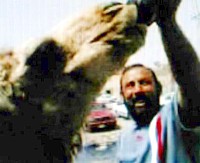Perspective: Face to face with Iraq's most wanted
 Abu Deraa caught on hidden camera feeding a camel
Abu Deraa caught on hidden camera feeding a camelA CONVOY of about 10 unmarked sedans filled with bodyguards arrives at a small, nondescript home in Sadr City. They quickly fan out to throw a cordon around the property. Inside, small talk on the merits of learning Arabic comes to an abrupt halt - the face of death has entered the room.
This is Abu Deraa. To the Americans and to elements of the Iraqi Government he is a mass murderer. But to millions of Shiites, his rampages across Baghdad and beyond are their salvation.
Revered and reviled for his orchestration of thousands of Sunni deaths in a sectarian war that is tearing Iraq apart, Abu Deraa has been dubbed by friends and foes as "the Shiites' Zarqawi". He may top the most-wanted lists for the US and some government officials, but Abu Deraa is held high by Shiites because one of their own now casts a shadow over the land that is as menacing as that of Abu Musab al-Zarqawi, the depraved Sunni terrorist leader who died in a US air strike in June.
Unlike Zarqawi, who used the internet to drive a vast publicity machine that always took credit for his deeds, Abu Deraa has carefully shielded himself, building mystique and a huge following through bloody and merciless terror. This week, however, after a month-long series of tense negotiations through intermediaries, the warlord agreed to meet the Herald in his first face-to-face interview with a foreign reporter.
Small and very quietly spoken, he smokes heavily as he sits cross-legged on a floor cushion. Unsurprisingly, he presents himself as a simple man who is proud to "fight" for his country. "I'll be the first and the last to defend my people and my creed from troublemakers," he says.
In Abu Deraa's book, there are two camps of troublemakers. First, the American-led coalition forces in Iraq, and then a violent and indiscriminating Sunni insurgency which is killing Shiite Iraqis en masse as it is cheered on by Sunni political and tribal leaders and a popular support base.
In our hour-long meeting in a private home in Sadr City, a Shiite stronghold in Baghdad, Abu Deraa says: "You hear how the Shia are dying. But I never act unless I'm sure and have proof from witnesses who swear that my targets have killed my Shia brothers - then I find a solution.
"Shiite families are weak when their sons have been killed - they cannot defend themselves, so they ask for my help."
Read the rest at the Morning Herald

<< Home